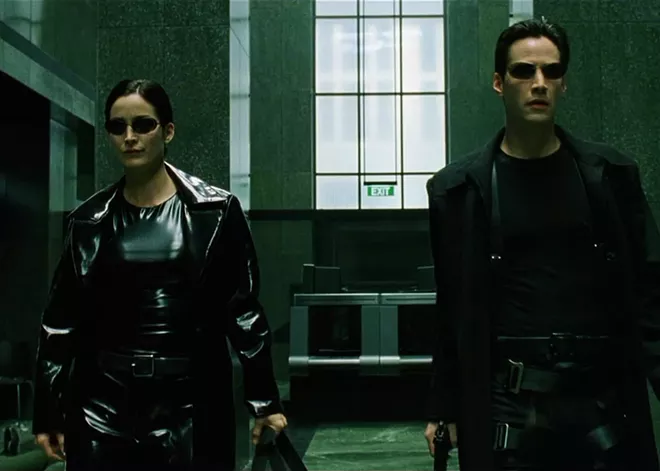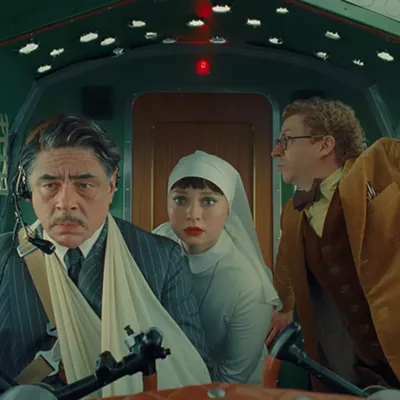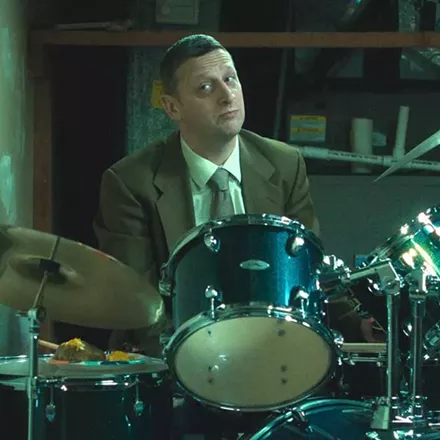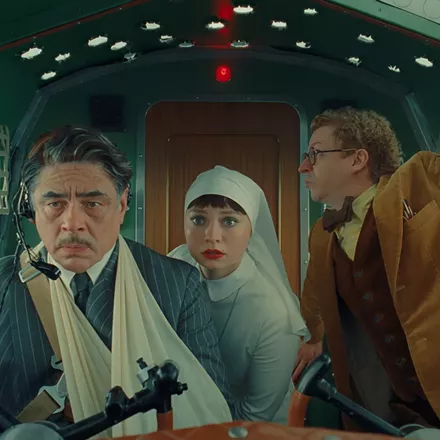"A blinking cursor pulses in the electric darkness like a heart coursing with phosphorus light, burning beneath the derma of black-neon glass."
So begins the shooting script for Lana and Lilly Wachowski's 1999 cyberpunk noir-fu head trip The Matrix, which seemingly came out of nowhere and forever changed the landscape of cinema. Right off the bat, that opening description presents a microcosm of the whole film: enigmatic, arresting, more than a little florid and pretentious, and obviously incredibly well thought through. The Matrix's clarity of vision is but one of the multitudinous factors that make it as relevant and enjoyable today as it was when it debuted a quarter century ago.
"THE MATRIX HAS YOU."
This tagline was emblazoned in OCRA-A font across The Matrix teaser posters featuring human embryos encased in slimy pink pods. Along with its disorienting trailer they sowed understandable skepticism about this heady and vaguely marketed action flick.
At the time, star Keanu Reeves was at a career low, having already belly-flopped in his first turn at the sci-fi genre with the woefully received Johnny Mnemonic in 1995.
But whether they knew it or not, audiences of '99 were perfectly primed for The Matrix. Clinton-era economic stability had led to a general sense of complacent malaise, though conspiracies about hidden worlds and boogeymen in black suits and shades thrived thanks to the popularity of The X-Files, Men in Black and the burgeoning phenomenon of internet message boards. Those virtual communities traversed the boundaries of time and space with their paranoiac theorizing and stoner philosophizing. Additionally, the final spring of the 20th century saw a blossoming technophobia thanks to the possibility of a "Y2K" digital apocalypse that loomed large. The vibes were simultaneously suffocatingly anodyne and soaked in dread. Something game-changing was necessary to give the unexpecting masses a good, hard look behind the proverbial digital looking glass.
Aspects of The Matrix do read as endearingly quaint, as it's an artifact of the pre-smartphone era — a high-water mark of the "Nokiawave" subgenre. But retro trappings notwithstanding, The Matrix remains eerily prescient. The underground resistance fighters of the blighted real world, led by Morpheus (Laurence Fishburne) and Trinity (Carrie-Anne Moss), escape the Matrix's facsimile reality through landline phones. And the cumbersome (if sexy!) cellphones they wield are only useful for cordless conversation.
In 2025, we find ourselves more plugged in than ever before — hapless addicts to the computers in our pockets and on our wrists, often spending more hours in a virtual world than the tactile one that our flesh bags inhabit. Our every move in physical and digital space is tracked and monitored, something we shrug off as the new normal. And that's to say nothing about how the conversation around artificial intelligence has evolved over the last quarter century, and accelerated exponentially over the past two years. Our own version of "the Matrix" does indeed "have us," all the more reason why The Matrix continues to elicit thrills with its brainy ambition.
That The Matrix was able to predict such contemporary dangers, synthesize so many collective anxieties, engage with academic explorations (Jean Baudrillard's simulacrum, René Descartes, Plato's allegory, evolutionary psychology, religion, determinism, gnosticism, systems of control, the cult comic books The Invisibles and Hard Boiled, and many more topics than I have space to mention), and make them all palatable to wide audiences persists as a cinematic miracle. The Wachowskis wisely smuggled their .torrent of deep thoughts — and what, in retrospect, is a clear allegory for the transgender experience — within a mash-up of wildly inventive visual effects and pop culture influences like Hong Kong wuxia films, industrial goth subculture, body horror, and shoot-em-ups. But The Matrix transcended the sum of its parts: It endures as its own cultural milestone, inspiring a glut of parodies and copycats. (Say it with me now: "bullet time.") The Wachowskis were even pioneers of the now-commonplace concept of a trans-media shared universe, subsequently expanding the Matrix lore through sequels, video games, comic books and animation.
Personally, The Matrix has evolved from being a go-to rewatch staple at adolescent sleepovers (The Matrix was the first film on the then-nascent DVD format to sell over 3 million copies) to the victuals of hifalutin discourse in my college "Dystopian Sci-Fi" comparative lit class to a cherished gem I marveled at in large scale during repertory theatrical showings. I salivate at the opportunity to see it on the big screen once again, and not just out of nostalgia. More of The Matrix's secrets, immaculate composition, and resonance are unearthed with every revisitation.
To quote Reeves' Hacker-cum-messiah Neo, seeing The Matrix in theaters will always make you say, "Whoa." ♦
The Matrix screens at Regal Cinemas April 3 & 4.


























